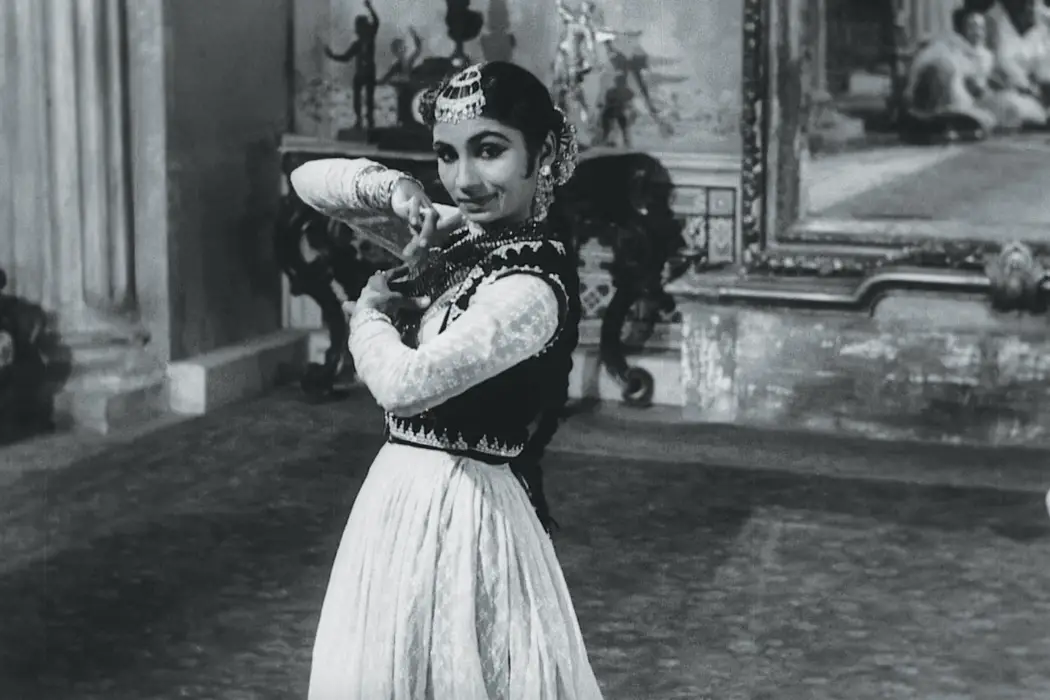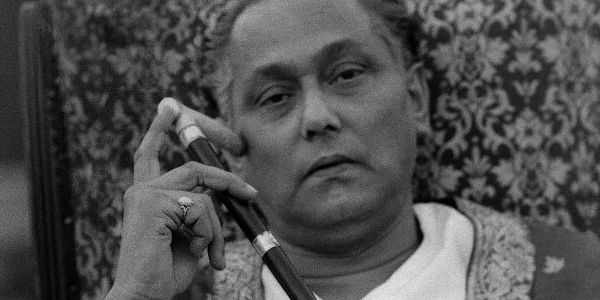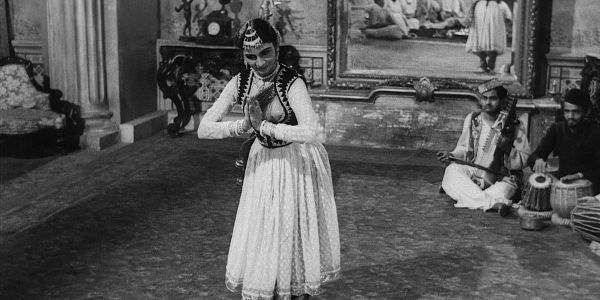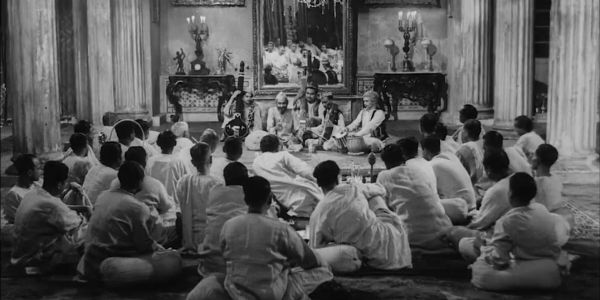Transcendence and Snobbery in Satyajit Ray’s THE MUSIC ROOM

Data analyst living in Manchester. Writes for Film Inquiry, The…
To spot arrogance and pretension in others is easy because these traits are conspicuous in their ugliness. But when I see it in myself, my instinct is to deny that I have behaved with the same unpleasantness. Financial success, employment, creating, art-appreciation, religion, education, even exercise – almost every form of personal fulfillment can lead to feelings of righteousness and superiority, especially if we use them to measure the value of our lives. It’s at best ironic and at worst a contradiction that, for example, a film that aims to express the universality of living and the necessity of compassion can also trigger a viewer into believing that they are more enlightened than the person next to them.
The tragedy of Biswambhar Roy in Satyajit Ray’s The Music Room, taking the death of his family and the loss of his wealth as consequences of his self-importance is that he believes in a world where elitism, patriarchy, and status are of equal value to the spiritual advancement that art can sometimes induce. Satyajit Ray, the film’s composer Vilayat Khan, and actor Chhabi Biswas convince the viewer of Biswambhar Roy’s good taste and genuine love of great music. But it is naïve to expect a person with a sincere connection to one of humankind’s greatest accomplishments to also live their life by the empathy and spirit which it takes to produce it.
Former Luxury
With nothing to do but sit on the roof of a rotting palace, his family and past wealth now only memories, Biswambhar Roy looks out over the river which flows past his barren land. Everything he owns was given to him by the lucky draw of ancestry, but at the point in his life when the film opens, he has been left with nothing but the skeleton of former luxury. His servants bring him his favourite sherbet or hookah, as he grunts and indifferently accepts their service.
But he is suddenly brought to life by a lone melody from a distant shehnai, getting to his feet as if he hasn’t done so in days. He seeks out the sound with suspicion and, like the viewer, is unsure if it is in his head, or if a musician hidden in the sand clouds is coincidentally playing the music of his madness. It is neither, rather the sound of a concert being held at a neighbouring palace, one ostensibly full of life, compared to the ghostly structure that Roy inhabits.

The story of Biswambhar Roy’s tragic decline is accompanied in two forms by the music of composer Vilayat Khan. One form is the music that is played at the lavish concerts Roy puts on to outclass his supposed friends, which in the end becomes a drug that no longer works. Not because the quality of the artistry has decreased, but because his obsession with status and one-upmanship begins to outweigh everything else.
The other form is the music that overhangs the scenes of his downward spiral and eventual ruin. At first, the music is like a prophecy of his impending madness and poverty, before becoming the soundtrack to his empty existence. After the opening scene, a long, unbroken flashback shows how his life collapsed. But whether looking to his past or at his present situation, the music and Satyajit Ray’s use of it transforms The Music Room into a fairy-tale of a “king” driven into the loneliness of his own mind and memories.
The Music Room
During the film, three concerts are performed in the music room of Biswambhar Roy’s palace, and each one is put on after a bout of jealousy. A more ambitious neighbour of new money, Mahim Ganguly, wishes to expand his business and reputation, while still wanting to pay respects to Roy as a dominant figure in the small Bengali area. Unable to consider that his declining wealth is slowly diminishing his true power, Roy decides instead to undermine Ganguly by parading his good taste and apparent fortune.
The first concert, featuring a female thumri singer, presents the faces of the two warring men in detail, punctuated by sweeping shots of the intimate space and its audience. Biswambhar Roy seems frozen, looking longingly at the musicians as he lies on his side at the front of the group like a spoiled monarch. He is clearly in ecstasy, a rare moment when his material and elitist obsessions are distorted by the spiritual authority of the music, which represents the two sides of his addiction: art’s ethereal nature and the pride that comes with recognising a deep affinity to this same spirit. If Biswambhar Roy was only interested in showing off, which is undoubtedly a component of his pleasure, then he would have noticed the boredom and disinterest on Mahim Ganguly’s face, for whom this concert was planned in the first place in order to undermine his ambition.

Roy is always at the centre of this extraordinarily beautiful film, but the final concert contains the longest sequence where he is absent from the camera’s eye. For the concert’s entirety, everyone but the kathak dancer and the musicians are equal, lost together in hypnosis as the music and dance transcend the decadence of Roy’s music room. The cool, superior calm of the dancer’s face is a reflection of art’s true worth, and even Mahim Ganguly slips into the trance. Biswambhar Roy, lying on his side with a hookah in his mouth, looks happy and enriched, but as soon as the concert ends and his guests have left, he reverts to pettiness. The concert was a success, but the only worthwhile consequence of this is his feeling of triumph over Mahim Ganguly.
The Exclusion of Others
Art is still an exclusionary interest. This varies with respect to the artform and the subcultures within, but the stereotype of the pretentious “arty type” is real. There are people who want to change this perception, and people who, whether it is their intention or not, perpetuate it. Looking at the wider culture, it’s no accident that, in the UK, the arts sector had a hard time convincing the government and the public of its need for substantial emergency funding during this pandemic. Even when presented with evidence of its substantial contribution to the UK economy. One of the prevailing ideas which influenced politicians and the disparaging right-wing media was that art is only for the few, and that being an artist, as diverse an occupation as you can get, is a frivolous ambition.
But at an individual level it is understandable that some embody this stereotypical image. They know with bald certainty that art provides an abundance of benefits for society as a whole, and they are protective of what they believe is crucial to their way of living, sometimes to the point of feeling superior to those who are rightfully uninterested.

Satyajit Ray, a master whose work people all over the world feel they possess, used film to explore this complexity – however intentionally – as much as, how he put it, his “general attitude towards feudalism”. Without the combination of music and image, it would be extremely difficult to show both the spiritual pleasure of music and the shallow arrogance of some enthusiasts, who see it as a symbol of their enlightenment and/or wealth. As if taunting Biswambhar Roy through his collapse, the music which follows him around his deserted home oscillates like the slow bending of his mind as he remembers what he lost. At times, Vilayat Khan’s score is a manifestation of Roy’s own delusions.
Conclusion
The only moment when Biswambhar Roy shows fragility is when he is terrified by what he believes are bad omens. He is a superstitious man, and as if in opposition to the three concerts within the film, there are three moments that cause him great existential anxiety. It is during the second concert that he sees an insect drowning in his drink, while he and his guests luxuriate in a khyal performance, which was again planned following a seemingly innocuous visit from Mahim Ganguly.
His wife and son are away visiting family, but Roy demands that his servants call them back. He is told that a storm is coming, but he dismisses the possibility that his family may get caught while crossing the river. Midway through the performance, Roy sees thunder flashing through a window in the corner of the music room, another bad omen which, along with the dying insect, precedes the news that his wife and son are dead.
The memory of this night must haunt Biswambhar Roy beyond what the viewer is shown once the film returns from the flashback, within which the terrible event is depicted. The accusation that Roy is responsible for the death of his family is plain, but I also wonder if his dejection is as much a result of him having wasted his fortune and damaged his reputation in the process. Empathy grants the viewer the ability to almost cheering him on when he decides to hold the third concert, discussed above, once an admittedly smug Mahim Ganguly visits him on Roy’s request.
Later that night, as Roy’s audience awaits his arrival, he stops to admire a painting of his wife before entering the newly adorned music room, a long time empty and disregarded. Biswambhar Roy has used up the very last of his money, and once the concert is over, his jubilation and drunkenness are spoiled by a terrifying and poetic sign from the gods. His subsequent death reflects nothing of the honour that he tried so hard to cultivate during his life, and that in part is the tragedy. What was the point of it all in the end?
What is your favourite Ray film? Let us know your thoughts in the comments below!
Does content like this matter to you?
Become a Member and support film journalism. Unlock access to all of Film Inquiry`s great articles. Join a community of like-minded readers who are passionate about cinema - get access to our private members Network, give back to independent filmmakers, and more.
Data analyst living in Manchester. Writes for Film Inquiry, The State Of The Arts, Vague Visages.













